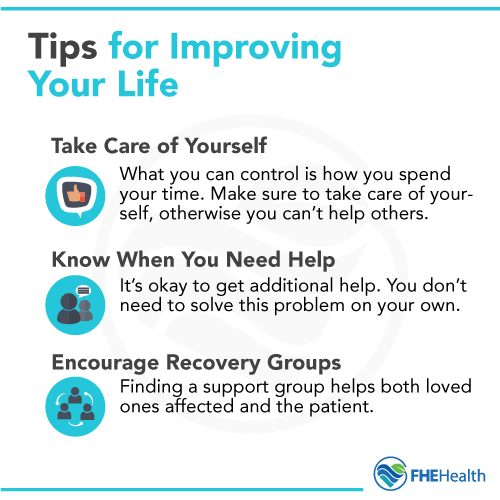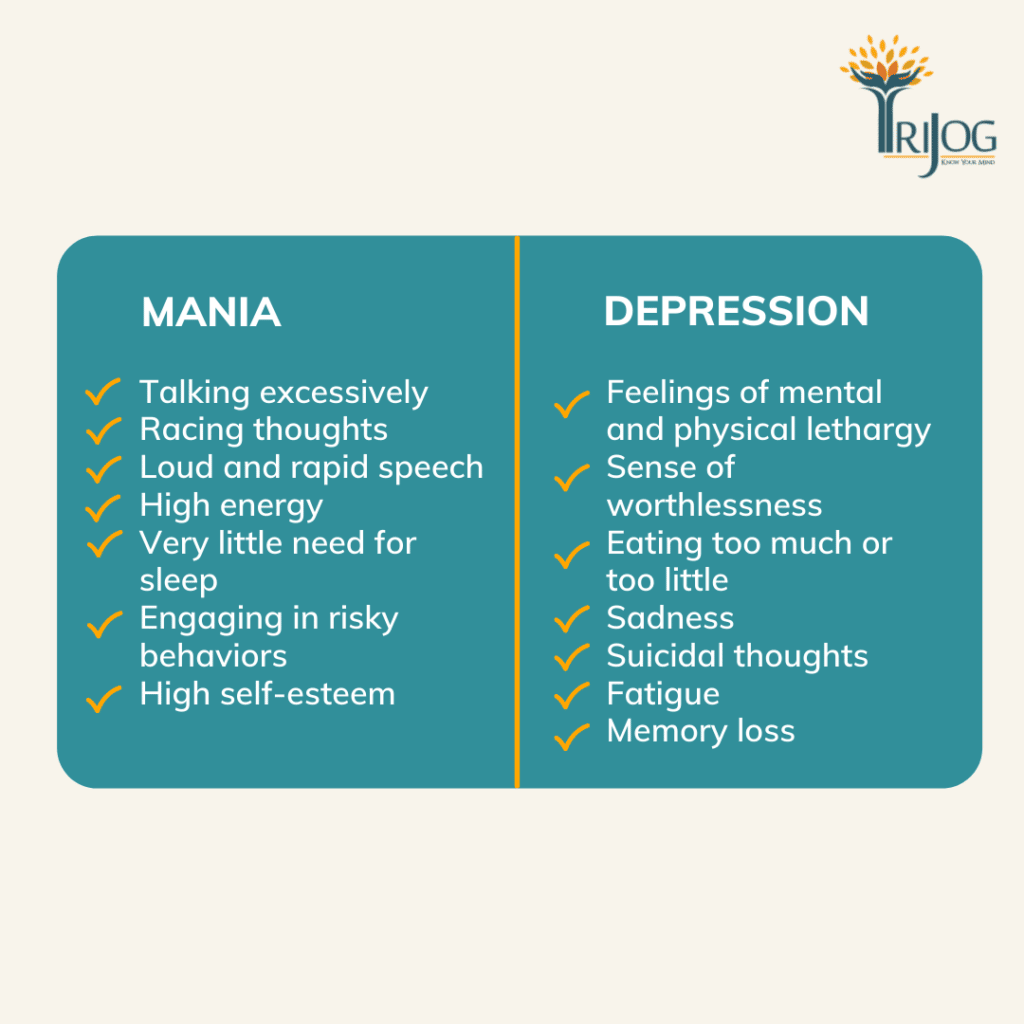Bipolar Disorder And The Family
Living with a person who has bipolar disorder can cause stress and tension in the home. On top of the challenge of dealing with your loved ones symptoms and their consequences, family members often struggle with feelings of guilt, fear, anger, and helplessness. Ultimately, the strain can cause serious relationship problems. But there are better ways to cope.
The first step to successfully dealing with bipolar disorder is for families to learn to accept the illness and its difficulties. When youre feeling frustrated or guilty, remember that bipolar disorder isnt anyones fault. Accepting bipolar disorder involves acknowledging that things may never again be normal.
Treatment can make a huge difference for your loved one, but it may not take care of all symptoms or impairments. To avoid disappointment and resentments, its important to have realistic expectations. Expecting too much of your family member can be a recipe for failure. On the other hand, expecting too little can also hinder their recovery, so try to find a balance between encouraging independence and providing support.
Affordable Online Therapy
Nearly 3 Million people have turned to BetterHelp for professional online therapy. Take the quiz and get matched with a therapist that fits your needs.
Need urgent help? .
Beyond Treatment: Things You Can Do
Regular Exercise: Regular aerobic exercise, such as jogging, brisk walking, swimming, or bicycling, helps with depression and anxiety, promotes better sleep, and is healthy for your heart and brain. There is also some evidence that anaerobic exercise such as weightlifting, yoga, and Pilates can be helpful. Check with your health care provider before you start a new exercise regimen.
Keeping a Life Chart: Even with proper treatment, mood changes can occur. Treatment is more effective when a patient and health care provider work together and talk openly about concerns and choices. Keeping a life chart that records daily mood symptoms, treatments, sleep patterns, and life events can help patients and health care providers track and treat bipolar disorder over time. Patients can easily share data collected via smartphone apps including self-reports, self- ratings, and activity data with their health care providers and therapists.
Get Help If You Think Your Loved One May Be In Danger
If it seems a crisis may be brewing if your loved one could be a danger to themselves or others due to sudden and intense shifts in mood, reckless or self-harming behaviors, or talk about suicide do not leave them alone, says Marcum. Call 911 or bring them to the emergency room so they can be evaluated and treated for bipolar disorder.
Dont let what they say or do prevent you from seeking help. And understand that their escalating bipolar symptoms may cause them to speak and act in ways that are out of character and that may be hurtful, says Guglielmi.
These are not to be ignored or condoned, but it is during these times that your loved one needs your guidance and support the most, he says. Again, a trusting relationship can play a key role in getting someone the help they need.
Also Check: Is High Functioning Anxiety Real
Challenges Of Bipolar Disorder
When people with bipolar disorder go through mood changes, they usually experience severe changes in their energy and activity levels, sleep patterns, and other everyday behaviors. Psychotic symptoms, such as hallucinations or delusions, may also occur during severe mood episodes. These can be frightening both for the person with bipolar disorder and for those around them.
Bipolar disorder is usually a lifelong condition. While many people with bipolar disorder may remain symptom-free for periods of time, their symptoms can return at any time. Sometimes those with bipolar disorder grow anxious during these symptom-free periods, unsure of when their next mood episode will occur.
Living with bipolar disorder isnt easy. But your support can make a positive difference in the life of someone with the condition, especially during mood episodes. Here are 10 steps you can take to help someone with bipolar disorder:
Be Active In Their Recovery

Its easy to say, Ive got your back, and then never actively contribute to their recovery. Mental health treatment usually consists of many therapy sessions and doctor visits. While you shouldnt always attend these appointments, offering to pick them up and drive them to their visit or calling them after theyve finished their session to see how it went will mean a lot. You can even visit them after their appointment or take them out for a bite to eat. These appointments can sometimes be complicated and stressful for people with bipolar disorder. Having someone there for them who shows up consistently can give them something to look forward to and encourage them to continue.
You May Like: What Is The Phobia Of Clowns Called
Tips For Coping With Bipolar Disorder In The Family
Accept your loved ones limits. Your loved one with bipolar disorder cant control their moods. They cant just snap out of a depression or get a hold of themselves during a manic episode. Neither depression nor mania can be overcome through self-control, willpower, or reasoning. So telling your loved one to Stop acting crazy or to Look on the bright side wont help.
Accept your own limits. You cant rescue your loved one with bipolar disorder, nor can you force them to take responsibility for getting better. You can offer support, but ultimately, recovery is in the hands of the person with the illness.
Reduce stress. Stress makes bipolar disorder worse, so try to find ways to reduce stress in your loved ones life. Ask how you can help and volunteer to take over some of the persons responsibilities if needed. Establishing and enforcing a daily routinewith regular times for getting up, having meals, and going to bedcan also reduce family stress.
Communicate openly. Open and honest communication is essential to coping with bipolar disorder in the family. Share your concerns in a loving way, ask your loved one how theyre feeling, and make an effort to truly listeneven if you disagree with your loved one or dont relate to whats being said.
Supporting a person with bipolar disorder
What you can say that helps:
Educate Yourself About Bipolar Disorder
The more you know about bipolar disorder, the more youll be able to help your loved one. Learn about the symptoms and treatment options offered for this condition. Research various facilities and find out basic ways that you can help the individual when theyre experiencing a shift in mood. The more you know about this condition, the more youll know how to be there for someone with bipolar disorder.
Read Also: Can Schizoaffective Turn Into Schizophrenia
Support Their Treatment Decisions
There may be times when you have to encourage them to seek professional medical advice, particularly if they have stopped their medication. However, they may want to skip therapy or explore a treatment you view as extreme. Remember that unless youre an expert, the person living with bipolar probably knows a lot more about it than you do.
Be Serious & Specific About Your Support
Instead of a blanket statement offering generic support, try being definitive. For example, you can give them certain days you are open to get together or talk on the phone. Offer to do something specific, like take them to an appointment or babysit their kids or pets. Also, consider other ways of support, provided your friend is open to the idea. Some especially helpful things include washing their dishes, taking out their garbage, or helping to tidy up. Especially if your friend is in a state of depression, these can be daunting tasks for them. Providing tangible support in times of need can bolster your friendship and bond.
Originally posted March 14, 2019
Recommended Reading: How To Relieve Anxiety Chest Pain
Ask Your Friend If There Are Any Ways You Can Helplike Checking In With Them If You Notice Certain Symptoms
Your friend most likely will not want you watching them like a hawk, randomly asking if theyre taking their medication, or doing anything else that can be invasive and hurtful. But learning about the symptoms specific to their condition can help you pick up on any changes that may signify an upcoming mood episode. And, if theyre comfortable with it, you can check in with them when you notice those symptoms.
For example, if someone is experiencing a depressive mood episode, they might become more isolated and stop replying to messages or calls if theyre dealing with a manic or hypomanic episode, they may become irritable, sleepless, or talk about many different things quickly, says Dr. Singh. Heres more information about the various symptoms of bipolar disorder.
If your friend starts exhibiting these symptoms in a way thats abnormal for them, Dr. Singh recommends saying something such as, You dont seem like your typical self. Is there anything I can do to help you get the help you need?
Its a much better strategy than ignoring a friends symptoms. A lot of times people dont know what to do, so they shut down, and thats probably the worst thing, says Danyelle.
The Importance Of Self
It can be incredibly frustrating, exhausting and confusing to deal with someone who is experiencing bipolar disorder. The only way you can be there to support your friend is if you look after yourself first.
Dont give up the things you enjoy
Make sure you still have time to yourself to do your favourite things and to work towards your own goals.
Set boundaries
You arent always going to be able to be there at every moment, and you cant let helping someone take over your life. Set some limits on the things youre willing, and unwilling, to do. For example, let your friend know that you wont take calls in the middle of the night or while youre at work. Plan with them what they can do if you arent available.
Make time to relax
Relaxation is a great way to deal with stressful situations.
Ask for support
Make sure youre getting your own emotional support. Talk to people you trust about how youre feeling. You might also want to talk about it in counselling or join a support group.
You May Like: What’s The Phobia Of Holes
Take Care Of Yourself
If you dont spend enough time on yourself, your spirit will suffer, and youll be less able to give your loved one the attention they need. Self care is critical for all of us. Your health and well-being must be your top priority, otherwise youll be too exhausted and overwhelmed to be of any real value to anyone you try to help. Dont be afraid to make time to pamper yourself periodically.
Get Them Out Of The House

When a person is in a low mood or lacking motivation for anything, its not uncommon for them to shut off the outside world. Self-isolation is a symptom of bipolar depression.
Go for a walk with your friend or loved one, grab a bite to eat together, or take a Sunday drive. Offer to pick him up and go for groceries or watch a sporting event together.
Giving your pal a fresh perspective will likely raise his confidence and could help release him from a frustrating state of inertia.
Read Also: How To Decrease Panic Attacks
How Can You Help Someone With Bipolar Disorder
Dealing with the ups and downs of bipolar disorder can be difficultand not just for the person with the illness. The moods and behaviors of a person with bipolar disorder affect everyone aroundespecially family members and close friends. It can put a strain on your relationship and disrupt all aspects of family life.
During a manic episode, you may have to cope with reckless antics, outrageous demands, explosive outbursts, and irresponsible decisions. And once the whirlwind of mania has passed, it often falls on you to deal with the consequences. During episodes of depression, you may have to pick up the slack for a loved one who doesnt have the energy to meet responsibilities at home or work.
The good news is that most people with bipolar disorder can stabilize their moods with proper treatment, medication, and support. Your patience, love, and understanding can play a significant part in your loved ones treatment and recovery. Often, just having someone to talk to can make all the difference to their outlook and motivation.
But caring for a person with bipolar disorder can also take a toll if you neglect your own needs, so its important to find a balance between supporting your loved one and taking care of yourself.
Tips On Maintaining Friendships When You Have Bipolar Disorder
I received a text from a college friend last week asking me if Ive ever noticed him acting manic-y. He explained that his girlfriend suspected he was bipolar and wanted him to seek professional opinion. This conversation made me think about the experiences Ive had with participants here at Optimum Performance Institute . Ive observed new participants entering the program starting to make friends and then witnessed those friendships fall apart.
Ive also seen some develop relationships that were very healthy and lasted beyond treatment.
So, what are the distinguishing factors between the relationships that have failed and those that have gone on to flourish? We all experience emotional ups and downs. For those with bipolar, these experiences may be more pronounced. What is it that keeps friends together despite the symptoms of bipolar when so many others fizzle out? I believe with the right tools, support, and practice, people with bipolar can maintain healthy friendships. I see it in my work all of the time.
After some research and good old fashioned soul searching, Ive come up with a few tips:
Although these tips are focused mainly on those who may be dealing with bipolar symptoms, they can be adapted for pretty much anyone struggling to maintain a relationship. I encourage you to get out of your comfort zone, take some baby steps, and implement one or two of these tips into your life. You might be glad you did!
Recommended Reading: Is Anxiety A Neurological Disorder
Make A Plan For Manic Episodes
When your friend, partner or family member is feeling well, try talking to them about the support you can offer during a hypomanic or manic episode. This can help you both feel more stable and in control of what’s happening.
You could discuss ideas such as:
- Enjoying being creative together.
- Offering a second opinion about projects or commitments, to help them consider whether theyre taking too much on.
- Helping to manage money while theyre unwell, if theyd like you to.
- Helping them keep a routine, including regular meals and sleeping patterns.
Listen More Than You Speak
Encouraging someone isnt always about knowing the right thing to say. It could even be not saying anything at all. In fact, simply offering your undivided attention is one of the best things you can do for someone with bipolar disorder. They may want to talk about their challenges or vent about their day, and thats normal. Offering your understanding can go a long way in making someone with this condition feel heard and understood. Whenever theyre venting or talking to you about their struggles, actively pay attention, stay calm, avoid arguing, and avoid any topics that may irritate or frustrate them.
Read Also: How Do You Know If Your Dog Is Depressed
Show Your Support With Specifics
Let your friend or loved one know you are there for them by being specific and authentic in your offer to help.
If they respond by saying they would like to have someone to talk to, then be precise in how you offer support. For example, you could say: I work during the day, Monday to Friday, and go to church on Sundays, but I can talk with you on the phone during evening hours and anytime on Saturdays. This shows them you are not giving them a vague or insincere offer of supportplus, a definite plan can be put in place.
Be Mindful Of Your Language
No, this isnt about cursing, but rather about using words like crazy, psycho, nuts, or cuckoo. So much of the prejudice that people have for those with mental disorders stem from the language people use to describe these individuals, as well as a lack of education on the topic. Its important to educate yourself on this condition and be mindful about the language you use around your loved one and when youre talking about them with others. Our jokes often stem from a place of truth, so be mindful of your words.
Don’t Miss: How Is Schizoaffective Disorder Different From Schizophrenia
Be Active In Their Treatment
Treatment for people with bipolar disorder usually consists of many therapy sessions and doctor visits. While you shouldnt necessarily attend these appointments, you can help someone with bipolar disorder by coming with them and then waiting for them until their appointment is over.
These appointments can sometimes seem complicated or scary to people with bipolar disorder. Having someone there who can offer support and talk to them may help reduce any stress or anxiety they may be feeling.
I Have Bipolar Disorder

There is a myth people with bipolar disorder use and abuse their friends. While I have no doubt that there are people out there who fall into that group, certainly, that isn’t all of us and I know it isn’t me. I love and appreciate my friends and I am cognizant of the fact that dealing with my bipolar has challenges for them, too.
And I work as hard at being a good friend to them as I hope they will be to me. I don’t believe in one-way friendships.
Also Check: What Part Of Brain Does Schizophrenia Affect